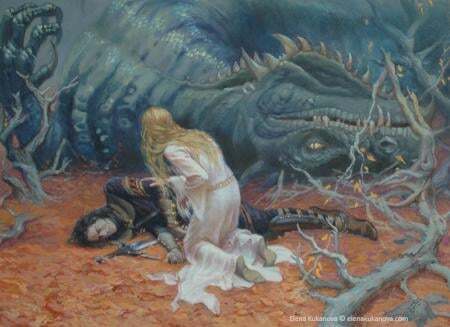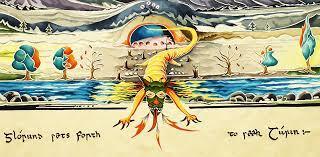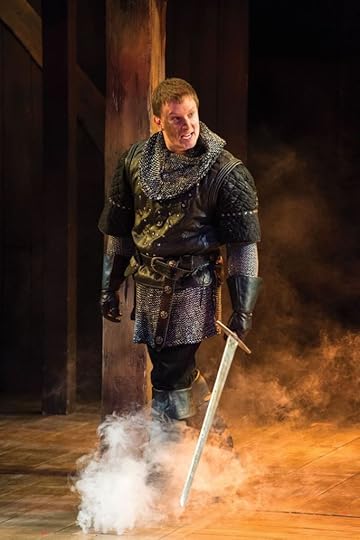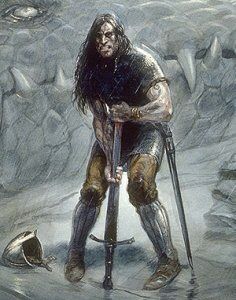Blind Read Through: J.R.R. Tolkien; The Book of Lost Tales, part 2; Túrin’s last tragedy

“There did she stay her feet and standing spake as to herself: ‘O waters of the forest whither do ye go? Wilt thou take Nienóri, Nienóri daughter of Úrin, child of woe? O ye white foams, would that ye might lave me clean – but deep, deep must be the waters that would wash my memory of this nameless curse. O bear me hence, far far away, where are the waters of the unremembering sea. O waters of the forest wither do ye go?’ Then ceasing suddenly she cast herself over the fall’s brink, and perished where it foams about the rocks below; but at that moment the sun arose above the trees and light fell upon the waters, and the waters roared unheeding above the death of Nienóri (pg 109-110).”
Welcome back to another Blind Read! This week, we conclude the tale of Turambar and the Foalókë and experience the last tragedies of Turambar’s life.
We left off last week with Turambar and Níniel deciding to ride out against the Foalókë, Glorund, to kill the drake. They gathered with them a group of men desperate to rid their land of the terrible beast, but on the way to the drake, they slowly abandoned the mission, leaving only a handful of mercenaries left, and “Of these several were overcome by the noxious breath of the beast and after were slain (pg 104).”

Eventually, only Turambar and Níniel were left to face the beast. “Then in his wrath Turambar would have turned his sword against them, but they fled, and so was it that alone he scaled the wall until he came close beneath the dragon’s body, and he reeled by reason of the heat and of the stench and clung to a stout bush.
“Then abiding until a very vital and unfended spot was within stroke, he heaved up Gurtholfin his black sword and stabbed with all his strength above his head, and that magic blade of the Rodothlim went into the vitals of the dragon even to the hilt, and the yell of his death-pain rent the woods and all that heard it were aghast (pg 107).”
The death of Glorund would seem like a cause for celebration, but unfortunately, Turambar’s efforts to end the scourge of the great worm only ended up in more tragedy.
His death was foretold from his early mistakes, and if he had only taken a little more time and been less impetuous, his life wouldn’t have ended up the way it was. Turambar is an echo of Hotspur, the firey prince of Shakespeare’s histories, where he has everything going for him, but because of his temper and strong desires, his life is degraded.

So how could Turambar’s life degrade from killing the drake, you might ask? Well, he passes out next to the Foalókë, and when Níniel comes to find him, she thinks he died along with the dragon in mortal combat. She weeps next to Turambar. She weeps for her husband. She cries for the man who killed the dragon and saved their people. But her weeping wakes Glorund for one last gasp.
“But lo! at those words the drake stirred his last, and turning his baleful eyes upon her ere he shut them for ever said: ‘O thou Nienóri daughter of Mavwin, I give thee joy that thou has found thy brother at last, for the search hath been weary – and now is he become a very mighty fellow and a stabber of his foes unseen (pg 109).”
Glorund died with these words, but what fell with the great beast was the glamor he held over Nienóri. She was suddenly aware of who she was and who Túrin was. Realization bombarded her that she had been married to her brother and had children with him. Aghast at the knowledge, she heads off to a waterfall called the Silver Bowl, contemplative. But instead of Nienóri coming to terms with the events of the last number of years, she is overwhelmed, and we get the quote that opens this essay.
Túrin wakes and quickly realizes that she is gone. He heads back to the village where the people already know the secret of their king and queen, and Túrin pulls it out of them. This being Túrin and his tragic story, he responds how you would expect him to:
“So did he leave the folk behind and drive heedless through the woods calling ever the name Níniel, till the woods rang most dismally with that word, and his going led him by circuitous ways ever to the glade of Silver Bowl, and none had dared to follow him (pg 111).”
Túrin turns to his sentient sword and begs for the only absolution his troubled life could understand.
“‘Hail Gurtholfin, wand of death, for thou art all men’s bane and all men’s lives fain wouldst thou drink, knowing no lord or faith save the hand that wields thee if it be strong. Thee I only have now – slay me therefore and be swift, for life is a curse, and all my days are creeping foul, and all my deeds are vile, and all I love is dead (pg 112).'”

“and Turambar cast himself upon the point of Gurtholfin, and the dark blade took his life (pg 112).”
The tale doesn’t end here, however; Tolkien switches us back to Mavwin and her search for her children. She wept and went into the woods, and the region of Silver Bowl became haunted by their past and presence.
Tolkien also lays on some of his Christianity, which is notably absent in the later editions:
“Yet it is said that when he was dead his shade fared into the woods seeking Mavwin, and long those twain haunted the woods about the fall of Silver Bowl bewailing their children. But the Elves of Kôr have told, and they know, that at last Úrin and Mavwin fared to Mandos, and Nienóri was not there nor Túrin thier son (pg 115).”
Both the children ended up as spirits because their transgressions forbade them from the afterlife.
Join me next week as we dive more into the religion of the story and break down just what Tolkien was going for with such a horrifically tragic story.



